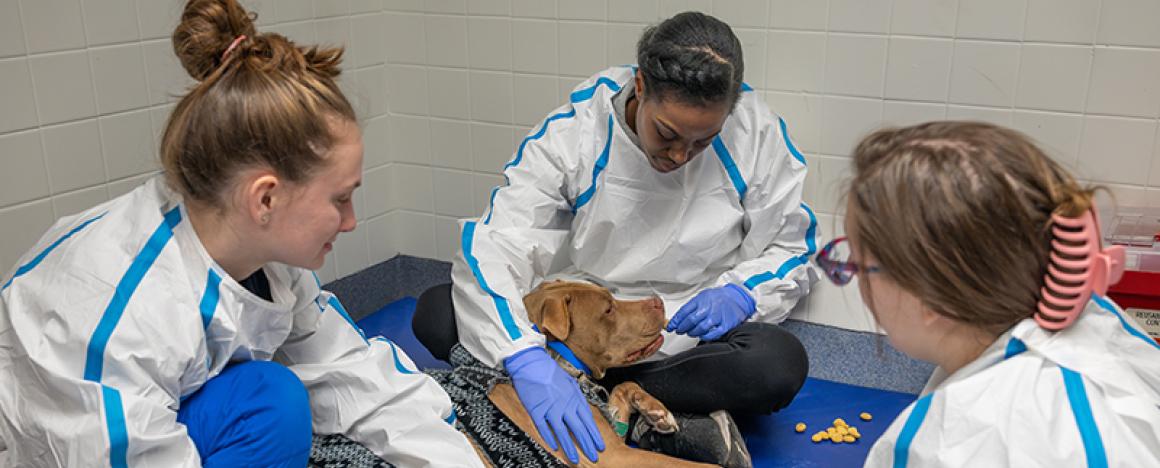Oncology

Referring Veterinarians
Referring a client to Foster Hospital is easy with veterinarian liaison support.
The Harrington Oncology Service is a collaborative group made up of medical oncology, radiation oncology, and the clinical trials service. We understand that a cancer diagnosis in any family member is very devastating, but our team is here to provide support and care for you and your pet in the face of a very challenging disease. While each situation is unique nearly all patients diagnosed with cancer have the potential to receive some form of treatment. We individualize our approach based on a variety of factors and our primary goal is always to maintain the best quality of life for each patient. The extent and duration of therapeutic treatment is dependent on many factors, including the type of cancer, stage of the disease, available therapies and what is the best fit for a pet and their caretakers.
What Happens at the First Visit?
The Harrington Oncology service is a teaching service, and your pet will be managed and seen by several different doctors who are either specialists or residents in oncology. The oncology group will be your pet's cancer care team. We meet twice daily to discuss all cases in-depth to ensure consistent management and partner with each other to use our combined knowledge to formulate a treatment plan best suited to you and your pet's needs.
Prior to making any treatment decisions a consultation with you and your pet is recommended. Initial visits usually last 1 to 2 hours, longer if additional tests are needed. At that time all treatment options will be discussed. Treatment should be instituted as soon as possible, but an immediate decision is not necessary. It is important to take time to consider all factors when selecting a treatment option. The decision to treat and the plan to follow is always your decision.
There are many issues that affect the treatment decision. First, there are tumor-related factors - these are associated with the specific type of tumor present. Tumor-related factors might alter prognosis, expected outcome and the likelihood of a cure or a long-term remission. The best treatment for a tumor may not be the best treatment for your pet. These are known as patient-related factors. Pre-existing conditions such as diabetes, heart disease, or kidney disease may prevent treatment from continuing and may also impact the eventual outcome. Lastly, owner-related factors also play an important role. Your decision as the caretaker of your companion animal is an important one. You must be sure to consider all factors such as time commitment, emotional turmoil, and monetary concerns. There are always many different options for treatment and the role of the oncologist is to help you understand all those options to reach an informed treatment decision.
What Types of Treatments Are Available?
Chemotherapy
Chemotherapy can conjure up many negative images and most owners fear for their pet's quality of life. Chemotherapy drugs are medications that are used to treat cancer. Most chemotherapy drugs cause side effects because they kill all rapidly dividing cells. Some medications will target specific mutations present in cancer cells. Chemotherapy can cause side effects such as vomiting or diarrhea, but, unlike humans, we use lower and less frequent doses, and this minimizes side effects. While some pets may still become ill from their treatment, over 90% of owners report that their companion’s quality of life is excellent during treatment.
Surgery
Surgery is a commonly used tool for the treatment of cancer and can result in a cure for many types of cancer. Surgery is a local treatment and works best in tumors that are unlikely to spread. We work with our surgery team to ensure the greatest likelihood of success by using advanced imaging, careful planning, and application of advanced surgical techniques.
Radiation Therapy
Like surgery, radiation therapy is a local treatment, meaning that it does not enter the body and generally treats a tumor in a single area. Patients cannot move when the radiation treatment is given so they are placed under anesthesia for each visit to ensure immobilization and accurate positioning. There are different types of radiation treatments such as intensity modulates radiation therapy (IMRT), stereotactic radiation therapy (SRT), image-guided radiation therapy (IGRT), palliative radiation therapy, and brachytherapy. The recommended treatment varies based on the tumor type, location, and expected outcomes with treatment.
Clinical Trials
Newer treatments such as immunotherapy, monoclonal antibodies, and other medications not widely available can be accessed through our collaboration with the Clinical Trials Service. These trials are generally funded by outside organizations with the goal of advancing research while helping both pets and people. These treatments are usually available at a significantly reduced cost and can widen the options for treatment. Clinical trials have very specific inclusion criteria; available trials can be found at the Clinical Trials Office
Advanced Techniques in Oncology
- Radiation therapies
- Technicians experienced in chemotherapy administration, radiation therapy delivery and anesthesia
- Intravenous, intralesional and intracavitary chemotherapy administration
- Ultrasound guided and manual needle-core (True-cut) biopsies
- Incisional and punch biopsies
- Bone marrow aspirates and biopsies
- Melanoma vaccine administration
- External beam radiation therapy with a 6MV linear accelerator with multileaf collimator and variable electron energies (range 6-18 MeV)
- Intensity modulated radiation therapy capability
- Three-dimensional computerized radiation therapy planning
- Strontium plesiotherapy radiation treatments
- Investigational therapies – clinical studies






